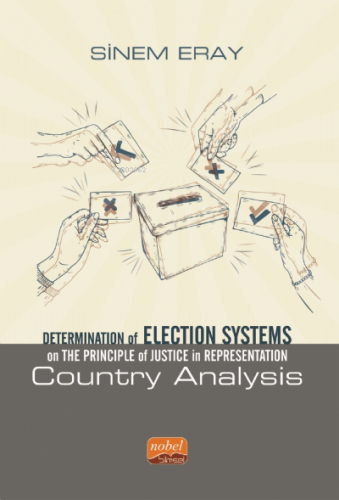Determination of Election Systems on The Principle of Justice in Representation: Country Analysis
Boyut:
165-240-
Sayfa Sayısı:
420
Basım Yeri:
İstanbul
Baskı:
1
Basım Tarihi:
2022-10-27
Kapak Türü:
Karton
Kağıt Türü:
Kitap Kağıdı
Dili:
İngilizce
Kategori:
%8
indirimli
470,00TL
432,40TL
Havale/EFT ile:
389,16TL
9786254337567
578284

https://www.sehadetkitap.com/urun/determination-of-election-systems-on-the-principle-of-justice-in-representation-country-analysis
Determination of Election Systems on The Principle of Justice in Representation: Country Analysis
432.40
A person who is responsible for choosing certain things at every stage of his life cannot always be rational in his choices. This situation does not change in every election about life, so it cannot be expected to show a different approach in party elections. In representative democracies, the people elect their rulers. Indeed, the key mechanism of reconciliation in a competitive society is elections. Although the history of voting dates back to ancient times, the same cannot be said for parliamentary democracy. Countries adopt different electoral systems according to their own government systems and administration styles. There are functional differences in their systems in countries that adopt the same electoral system. In this process, the consistency of the representation rate of the citizens of the country has a great impact on the country's democracies. In the study, the concepts of democracy, political participation, government systems, political parties and representation are explained. The electoral systems are detailed with examples and the parliamentary elections of the last thirty years of the countries that are called democratic for each electoral system are analyzed.
A person who is responsible for choosing certain things at every stage of his life cannot always be rational in his choices. This situation does not change in every election about life, so it cannot be expected to show a different approach in party elections. In representative democracies, the people elect their rulers. Indeed, the key mechanism of reconciliation in a competitive society is elections. Although the history of voting dates back to ancient times, the same cannot be said for parliamentary democracy. Countries adopt different electoral systems according to their own government systems and administration styles. There are functional differences in their systems in countries that adopt the same electoral system. In this process, the consistency of the representation rate of the citizens of the country has a great impact on the country's democracies. In the study, the concepts of democracy, political participation, government systems, political parties and representation are explained. The electoral systems are detailed with examples and the parliamentary elections of the last thirty years of the countries that are called democratic for each electoral system are analyzed.
Yorum yaz
Bu kitabı henüz kimse eleştirmemiş.










